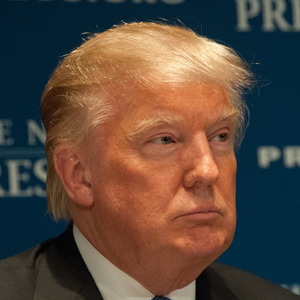Lawyers trade snarky letters over Trump suit threat; expert deems Trump 'pretty much libel-proof'

Image of Donald Trump from Albert H. Teich / Shutterstock.com.
Updated: Donald Trump’s lawyer was quick to respond when the New York Times published an article on Wednesday claiming the presidential candidate had groped one woman on a plane and kissed another on the lips, without either woman’s acquiescence.
Lawyer Marc Kasowitz of Kasowitz, Benson, Torres & Friedman wrote a letter to the Times’ executive editor demanding a retraction and apology, report the Washington Post and the Wall Street Journal Law Blog.
“Your article is reckless, defamatory and constitutes libel per se,” Kasowitz wrote. He asserted that the article was “a politically motivated effort to defeat Mr. Trump’s candidacy.”
The letter followed Trump’s vow to sue in an interview with a Times reporter for the article.
New York Times vice president and assistant general counsel David McCraw fired back with his own letter, according to a New York Times press release and story. McCraw said there would be no retraction.
“The essence of a libel claim, of course, is the protection of one’s reputation,” McCraw wrote. “Mr. Trump has bragged about his nonconsensual sexual touching of women. He has bragged about intruding on beauty pageant contestants in their dressing rooms. He acquiesced to a radio host’s request to discuss Mr. Trump’s own daughter as a ‘piece of ass.’ Multiple women not mentioned in our article have publicly come forward to report on Mr. Trump’s unwanted advances. Nothing in our article has had the slightest effect on the reputation that Mr. Trump, through his own words and actions, has already created for himself.
“But there is a larger and much more important point here. The women quoted in our story spoke out on an issue of national importance … . It would have been a disservice not just to our readers but to democracy itself to silence their voices.”
Trump’s lawsuit threat has raised questions about whether a suit could be successful, given First Amendment protections established by the U.S. Supreme Court.
First Amendment expert Ken Paulson told the Wall Street Law Blog it would be an uphill battle. “Donald Trump is pretty much libel-proof,” he said.
Paulson pointed out that because Trump is a public figure, he would have to prove the article was false and defamatory, and published with actual malice—meaning the Times knew the claims were false or published them with a reckless disregard for the truth.
In an interview with the Washington Post, University of California media law expert John Diamond agreed that actual malice standard could block Trump’s suit. “Given the malice requirement, the case would be easily dismissible, based on the fact of a credible interview,” he said.
Trump said in February that he believes the nation’s libel laws are too restrictive, according to this Politico article.
If elected, Trump said, “I’m going to open up our libel laws so when they write purposely negative and horrible and false articles, we can sue them and win lots of money. We’re going to open up those libel laws. So when The New York Times writes a hit piece which is a total disgrace or when The Washington Post, which is there for other reasons, writes a hit piece, we can sue them and win money instead of having no chance of winning because they’re totally protected.”
Updated at 2:40 p.m. to include response from the New York Times lawyer. Updated on Jan. 11 to correct spelling of Kasowitz’s first name.



